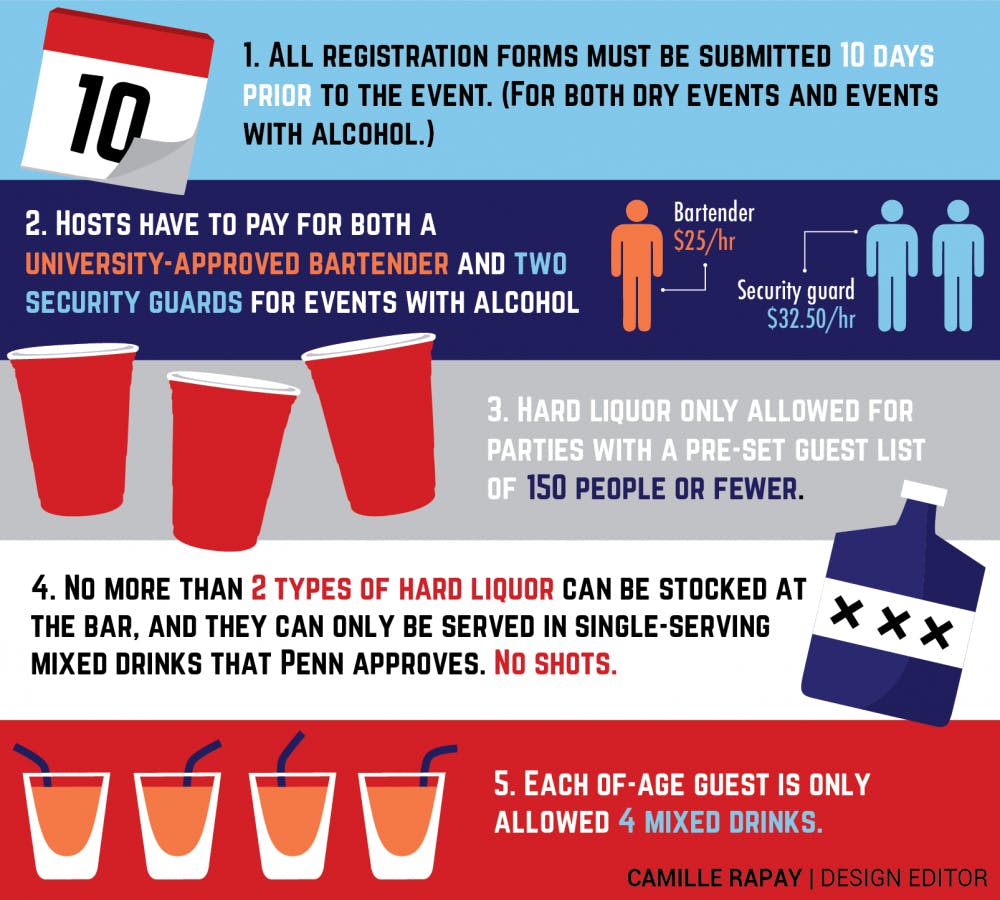On the evening of September 14, Elyse (C ’20) was studying with several friends on the third floor of her house near 40th and Pine Streets. The sound of a buzzer cut through the house. Elyse assumed that someone had invited a friend over, but the bell continued to ring on and off for ten minutes. On her stoop, she found three police officers. They were flanked by a cluster of six or seven more cops on the sidewalk, who were backed up by a surveillance van with two more officers in it. Some were dressed in bulletproof vests. Elyse wore pajamas and fuzzy socks.
The police said they were responding to a noise complaint but wouldn’t clarify whether a neighbor had filed a report or if they heard noise themselves. After asking them to turn down the music playing from the first floor, where a few of Elyse’s housemates were congregated, they took down her name. She explained that it wasn’t her music, and in the end refused to provide her PennCard number.
"I just didn't really know how to react to the situation," Elyse explained. "It's frustrating and excessive that a squad of cops showed up to a house where there were maybe four, five, or six girls inside who were not doing anything wrong."
Since returning to school, students have found themselves increasingly at odds with the administration’s new policies regarding social gatherings and alcohol consumption.
What started as a means to regulate parties has quickly evolved into an ongoing public relations disaster, with students continuing to push back against policies they believe to be unfair. However, the resulting actions stemming from recommendations made by the Task Force on a Safe and Responsible Campus Community in April have had unforeseen consequences concerning the social climate at Penn, igniting a conversation that probes into the depths of the socioeconomic divide, Greek and non–Greek social life, and safety concerns.
New policies target all student groups, but given the prohibitive cost for the school’s exhaustive list of required resources, social spheres composed of low–income students and groups with lower or no financial dues are the ones that take the hardest hit.
As students and administration alike settle into new regulations, questions concerning the school’s role in student lives are inevitable. How far can the administration reach into the private lives and homes of students? How transparent has the administration been with the undergraduate population? And, finally: do the new policies hurt students more than they help?
A spokesperson for Vice Provost for University Life Valarie Swain–Cade McCoullum—who oversees the Office of Alcohol and Other Drugs (AOD), the Office of Students Affairs (OSA), and the Office of Fraternity and Sorority Life (OFSL)—exchanged multiple emails with Street, but was unable to make the directors of those departments available for comment. Instead of making administrators available for interviews, VPUL sent a three–page statement. It didn’t address nearly any of the points of concern Street raised.
Although Greek groups are still saddled with a large financial burden, groups with lower or no dues aren’t just burdened by the new, mandatory costs—they are prohibitive to them.
The majority of fraternities collect hefty semesterly dues and have large member bases from which to collect a party fund. In response to the new event registration costs this semester, the IFC (Interfraternity Council) has begun to use money from a pool of collected fraternity fines. This fund is used to subsidize 50% of the costs associated with hiring bartenders and security guards for on–campus fraternities, according to IFC President Bradley Freeman (C ’18), effectively giving financial aid to the groups that can afford to shoulder these costs best of all. He hopes this new initiative will demonstrate to the university that more fraternities will register events if the associated costs are lower.
Smaller campus groups, like performing arts clubs and multicultural fraternities, will be hurt most. Most lack the finances to fund a single five–hour party, much less the several social events per semester that some of these groups aim for. And at the most individual level, new regulations force students who want to throw birthday parties or other occasional celebrations in their own homes to shell out unprecedented sums of money.

Students like Susanna Jaramillo (E ’19) were immediately stricken by how harshly these regulations would affect her organization.
Susanna, a former video producer for the DP, is the vice president of Penn Glee Club. She is in charge of organizing off–campus social events for the organization. These gatherings are usually after–show celebrations, internal parties, or parties with other performing arts groups.
For the past few NSOs (New Student Orientation), Glee Club has thrown a joint party with the Bloomers band in an off–campus performing arts house. This live music party is mainly for freshmen, to acquaint them with the performing arts community and expose them to a very different facet of Penn’s social scene during the flurry of NSO frat parties.
At the time, Susanna was unaware of the exact requirements for registering events. Glee decided to have the event anyway and organized it internally by designating members as sober monitors and bartenders and stationing students at the door and on the stairs. The event was eventually shut down, with Event Observers and police officers citing a noise complaint.
"They said, 'You just have to register your party next time,' but nobody really knows what that means because they don't go into what that entails and the cost behind it,” noted Susanna.
On August 17, Cade and Vice President for Public Safety Maureen Rush emailed the student body with an update on policy changes stemming from the Task Force’s recommendations. “Going forward, Penn expects all student groups...to register any event with alcohol,” the email stated.
Students like Susanna remained confused about which events needed to be registered. The email was nebulous about what counts as a party, Susanna explained, so they weren’t exactly sure how to go about the registration process or aware of the associated costs.
They’ve hosted more events this semester and taken extra steps to not get them shut down, such as turning down the bass on the music and reducing capacity. All of this comes from a conscious recognition of the cost of event registration. Groups that sponsor events with alcohol are required to pay $90 per hour to hire a university–sponsored bartender and two university security guards. Even though Glee collects dues, these are mainly funneled into travel costs for shows and their tour, along with uniforms and other operating costs. They don’t have a large social fund.
"We objectively don't have the financial means to register things like that,” Susanna said.
Beyond Glee club events themselves, the off–campus house is a hub for other performing art group social events, such as the smaller theater groups that often have no more than ten people.
Susanna ultimately sees the new policies as having a disastrous effect on the future of the performing arts social scene, effectively killing off these events or forcing them into secrecy. Their events are often geared towards students who may not feel comfortable attending fraternity parties, and it’s their hope that they can still provide these people with a social outlet they feel welcome in.
"It's meant to be a safer space,” Susanna continued. “A lot of my friends who come to Glee parties or just to theater parties feel safe in those spaces because they know that there are people there who will take care of them. I feel like it's taking away this space for those people."
Rio Dennis (W ’19) recognized the same catastrophic effect that these new regulations would have on Intercultural Greek Council and LGBTQ organizations.
Rio is one of six members of Penn’s chapter of Zeta Phi Beta Sorority, Inc., a historically black on–campus sorority. They hold service and social events a few times a month.
"I feel like a lot of times Penn doesn't acknowledge the fact that the Intercultural Greek Council (IGC) exists," Rio says.
Greek organizations under the IGC umbrella sometimes host events in off–campus houses, which Rio and her sisters often help run.
Though IGC chapters collect dues from members, they are much smaller than IFC and PHC dues. Zeta Phi Beta Sorority, Inc. uses these dues to help provide food and supplies for their bi–monthly events, such as its scholarship formal for high school honorees.
"With the fact that we're smaller chapters and we don't pay as much in dues, we actually have to charge for our parties," Rio remarks. Entrance fees usually start around $5. This tactic is technically illegal, since money cannot be exchanged for alcohol without a liquor license in Pennsylvania. But this has gone unchecked until now. With more scrutiny, they will no longer be able to fund events in this manner.
"We barely have enough money to throw the actual party itself.”
To Rio, it seems as if the University is trying to rob them of their social role on campus, which helps them to attract and meet potential new members.
Rio also serves as chair of the Penn Queer Straight Alliance, where she plays a part in organizing LGBTQ social events in off–campus houses. Like IGC parties, queer parties charge entrance fees in order to supply alcohol, and therefore are functionally prohibited under the new Task Force recommendations.
"I just don't think that the people who made up the Task Force thought through completely what these implications are,” Rio continued. "It's the queer group, it's the Intercultural Greek Council, and those other small groups that are really just trying to hang out with people and feel like they can't fit into other spaces who are being the most affected by it."
The Task Force was formed as a result of widespread student protests in response to a sexist party invitation sent by off–campus organization OZ. In her student–wide email announcing the Task Force in November 2016, Penn President Amy Gutmann said one of the group’s goals would be “to foster a campus climate and culture that is free of sexual harassment and sexual violence.”

The Task Force on a Safe and Responsible Campus Community was created in February 2017 by President Amy Gutmann and former Provost Vincent Price. In April, at the conclusion of the Task Force’s work, the University announced these recommendations and posted them on the Office of the Provost’s website.
The Task Force laid out their mission statement in the spring. But the Task Force’s reach ends only at recommendations. These suggestions have fueled administrative policy this semester, enforced by VPUL and DPS. VPUL announced this rollout to the student body via the email on August 17, supplying an attachment of its official recommendations.
VPUL made three declarations: all off–campus groups must provide the University with a list of members, all events with alcohol must be registered with the Office of Alcohol and Other Drug Program Initiatives (AOD), and the number of Event Observers, formerly known as Alcohol Monitors, will be increased to accommodate a new off–campus patrolling zone.
This news came five days before the start of NSO, throwing student groups, on–and off–campus Greek organizations, off–campus residents, and new freshmen into a state of confusion. It was too late to register events, so most would learn through experience how the Task Force monitors social events.
On September 16, the on–campus sorority Alpha Phi threw a mac and cheese fundraiser event for the American Heart Association at the Beta Theta Pi chapter house. The event was dry and registered with the University, and sorority sisters were careful to make sure that no alcohol was brought into the event. Guests paid $4–$5 to enter and then had free access to a mac and cheese buffet. All proceeds collected between the event from 10 p.m. to 2 a.m. were to be donated to charity.
Rachel*, a senior in Alpha Phi, observed that Event Observers were present at points throughout the night. The event had music playing, but most students were standing around, eating, and talking. At around 12:30 a.m, the police showed up and kicked everybody out, citing a noise complaint. There was no warning beforehand. At most, there were no more than 70 people spread indoors and outdoors when the event was closed down.
"It was heartbreaking, especially because this was all for charity and it was so strictly sober and everyone was following the rules," Rachel explained. "We could have had another hour's worth of money going to charity."
The University attempted to educate campus leaders on new regulations by hosting an event on September 13 called “We Are Penn: A Community Conversation,” billed as a forum surrounding the Task Force’s recommendations. Katie Bonner, executive director of the Office of Student Affairs, sent out an email to heads of student organizations two weeks before, requesting that they provide full rosters of active members, add auxiliary addresses for off–campus houses onto the GO Penn database, and send three representatives to attend the presentation. There was no time for in–person questions or conversation during the meeting.
As The Daily Pennsylvanian reported, Bonner presented a number of new measures to the student leaders in attendance, intended to curb hazing and sexual assault. Bonner clarified that all student organizations will be required to register events with the University more than ten days before their scheduled date, regardless of whether or not they plan to serve alcohol.
To register an event, groups must fill out a three–page registration form on the VPUL website. Host organizations are required to provide names of contacts within the group, the anticipated size of the event, description of alcohol to be served, description of the facility, as well as a list of sober monitor for every 30 guests.
Additional stipulations surrounding alcohol were also rolled out. Parties with more than 150 guests can’t serve hard liquor, only two types of hard liquor can be present at a party, liquor must be served in Penn–approved mixed drink serving sizes, and each legal guest can only have four mixed drinks throughout the course of the night. “Appetizing” snacks and non–alcoholic beverages must also be made available. Hosts cannot charge guests an entry fee or make them pay for alcohol. Alcohol cannot be served past 1:00 a.m.

All registered events, dry or otherwise, are subject to drop–ins from Event Observers, who check to make sure that the capacity is under control, that no one is trying to go upstairs, and that none of the partiers appear too drunk. Event Observers are paid $35 an hour to patrol Thursday to Saturday from 9:30 p.m. to 2 a.m.
Most strikingly absent from the presentation was a simple quantification of what constitutes a party. Bonner did not specify any limit or attendance measures that would require a social event to be registered with the University—the policy does not specify what qualifies as an event that must be registered and what is simply a gathering of friends in an off–campus house.
Soon after the meeting, Cami Potter (C ‘18), a Street writer, wrote a Change.org petition, which garnered over 2,500 signatures, that criticizes the administration for expending resources on breaking up frat parties. Despite student outcry, the administration has not altered its policies.
Bradley Freeman, the president of the IFC, has worked with the administration to address concerns about the enforcement and sustainability of the new policies.
If Event Observers catch an IFC group throwing an unregistered party, they are required to appear before the Judicial Inquiry Board, an organization of Greek–affiliated peers that recommends punishment for infractions.
"We have a security blanket as on campus chapters that we're not held personally liable," he explains.
All other student groups appear before administration at the Office of Student Conduct if they are caught doing the same, along with IFC groups charged with particularly egregious offenses.
Bradley recommended that the school be more flexible with the event registration timeline, cover some of the associated security and bartender costs that are being forced on hosting groups, and hire more university–appointed bartenders and security guards to accommodate an increased demand.
At one point, the Alcohol and Other Drug Program Initiatives (AOD) used to incentivize event registration by covering some costs, but they no longer do so.
"The school cannot handle enough registered events happening in the same night or weekend," explained Bradley.

This will be especially prevalent during Spring Fling, when groups will be forced to compete for registration slots, since there’s a limited number of university–approved bartenders and security guards to go around. Since the start of the semester, there have been 49 applications for registered events, of which the University only approved 16. Twenty–nine more applications have since been submitted and are under AOD review, but it is unlikely that the school will be able to approve the majority of the events. Because the University cannot accommodate more than a few registered events per week, understaffing creates a vacuum inevitably filled by unregistered parties. And now, it’s not just Greek organizations that are competing for the registration slots.
"Fraternities are in a better position to afford this, but it's not fair for everyone,” Freeman said.
He fears a system where only the people who can have fun are are the ones who can afford it, through events like Owls Brunch, downtowns and advance ticketed events.
Josh*, a senior in an off–campus organization, says that his group has tried particularly hard to comply with University regulations, despite a lack of any immediate benefits.
In the past year, his fraternity has had a fairly good relationship with the school.
"We were one of the few off–campus groups to send in a full roster,” he remarked. They knew that Penn was aware of leaseholders in each of their houses, so they might as well attempt to establish a rapport with the school.
"I can see in the near future people at my house being like 'Fuck it, we're just gonna throw shit and take responsibility for it like we always have.' I think that's definitely the direction it's heading.”
They’ve tried since NSO to register parties but have mostly been deterred from throwing events in the first place.
"This year I can’t say we've had any events shut down because of it, because we literally just haven't had anything at any of our houses," said Josh.
His frat had its first university–registered event on Friday, September 22. The party ended up getting overcrowded, and died off when they tried to move the party into a larger house. Brothers tried to bring along the university–sponsored bartenders and security guards with them, but their attempts failed. Sophomores and juniors in his group went to their standing weekly meeting with University officials, who dismissed the event as an accident.
“It’s been positive so far to have that line of communication open,” Josh said.
His group occasionally hosts downtown events, but Josh is scared to see Penn’s social scene pushed off campus.
He fears a future when the only event happening on a Friday night is a $20 Uber away and requires a $20 cover fee.
Off–campus social events have their own safety concerns. As these new Task Force recommendations push social events further away from the school, they leave the bounds of MERT and Penn Police. Both groups patrol an area between 30th and 43rd Streets between Market and Baltimore. If a student needs medical help at an off–campus event, they can’t rely on MERT for assistance.
Josh’s group has brothers from low–income backgrounds who are usually introduced to the group through on–campus events. But if they can only ever have downtown parties, Josh is worried that his group’s “rich kid” stereotype will self–actualize.
"There's a real lack of communication of what the expectations are and what a realistic future would look like."
* Reflects name has been changed.

